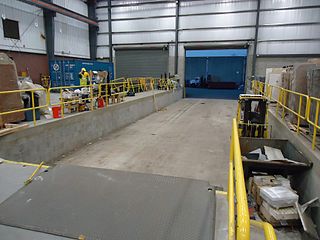
In commerce, supply chain management (SCM) deals with a system of procurement, operations management, logistics and marketing channels so that the raw materials can be converted into a finished product and delivered to the end customer. A more narrow definition of the supply chain management is the "design, planning, execution, control, and monitoring of supply chain activities with the objective of creating net value, building a competitive infrastructure, leveraging worldwide logistics, synchronising supply with demand and measuring performance globally".This can include the movement and storage of raw materials, work-in-process inventory, finished goods, and end to end order fulfilment from the point of origin to the point of consumption. Interconnected, interrelated or interlinked networks, channels and node businesses combine in the provision of products and services required by end customers in a supply chain.

Logistics is a part of supply chain management that deals with the efficient forward and reverse flow of goods, services, and related information from the point of origin to the point of consumption according to the needs of customers. Logistics management is a component that holds the supply chain together. The resources managed in logistics may include tangible goods such as materials, equipment, and supplies, as well as food and other consumable items.

A supply chain is a complex logistics system that consists of facilities that convert raw materials into finished products which are later distributed to end consumers or end customers. Meanwhile, supply chain management deals with the flow of goods within the supply chain in the most efficient manner.
A value chain is a progression of activities that a firm operating in a specific industry performs in order to deliver a valuable product to the end customer. The concept comes through business management and was first described by Michael Porter in his 1985 best-seller, Competitive Advantage: Creating and Sustaining Superior Performance.
The idea of the value chain is based on the process view of organizations, the idea of seeing a manufacturing organization as a system, made up of subsystems each with inputs, transformation processes and outputs. Inputs, transformation processes, and outputs involve the acquisition and consumption of resources – money, labour, materials, equipment, buildings, land, administration and management. How value chain activities are carried out determines costs and affects profits.
A supply network is a pattern of temporal and spatial processes carried out at facility nodes and over distribution links, which adds value for customers through the manufacturing and delivery of products. It comprises the general state of business affairs in which all kinds of material are transformed and moved between various value-added points to maximize the value added for customers. In the semiconductor industry, for example, work-in-process moves from fabrication to assembly, and then to the test house. The term "supply network" refers to the high-tech phenomenon of contract manufacturing where the brand owner does not touch the product. Instead, she coordinates with contract manufacturers and component suppliers who ship components to the brand owner. This business practice requires the brand owner to stay in touch with multiple parties or "network" at once.
Postponement is a business strategy employed in manufacturing and supply chain management which maximizes possible benefit and minimizes risk by delaying further investment into a product or service until the last possible moment, or where a manufacturer produces a generic product, which can be modified at a later stage before the final distribution to the customer. An example of such a strategy is Dell Computers' build-to-order online store. One of the earliest references to the concept was in a paper by Zinn and Bowersox in the Journal of Business Logistics in 1988, which highlighted five types: labelling, packaging, assembly, manufacturing and time postponements.

HP SPaM is an internal consulting group that supports HP businesses on mission-critical strategic and operation decisions. As evidenced by its publications and awards, SPaM has been a prominent example of the deployment and practice of OR/MS in large companies. Together with HP Labs, SPaM represents HP at the INFORMS Roundtable, a group of organizations whose purpose is to promote OR/MS excellence in practice.

Although logistics has been mostly utilized in commercial supply chains, it is also an important tool in disaster relief operations. Humanitarian logistics is a branch of logistics which specializes in organizing the delivery and warehousing of supplies during natural disasters or complex emergencies to the affected area and people. However, this definition focuses only on the physical flow of goods to final destinations, and in reality, humanitarian logistics is far more complicated and includes forecasting and optimizing resources, managing inventory, and exchanging information. Thus, a good broader definition of humanitarian logistics is the process of planning, implementing and controlling the efficient, cost-effective flow and storage of goods and materials, as well as related information, from the point of origin to the point of consumption for the purpose of alleviating the suffering of vulnerable people.
Hans Ronald "Harold" Krikke is a widely recognized scientist in Closed Loop Supply Chains.
Management accounting in supply chains is part of the supply chain management concept. This necessitates planning, monitoring, management and information about logistics and manufacturing processes throughout the value chain. The goal of management accounting in supply chains is optimizing these processes. This strategy focuses on supporting management.

This article outlines the evolution of management systems. A management system is the framework of processes and procedures used to ensure that an organization can fulfill all tasks required to achieve its objectives.
Serguei Netessine is a scientist, educator, academic administrator and startup investor. He is Senior Vice Dean for Innovation and Global Initiatives and Dhirubhai Ambani Professor of Entrepreneurship and Innovation at the Wharton School of Business, University of Pennsylvania. Previously, he was Professor of Global Technology and Innovation at INSEAD and the Research Director of INSEAD-Wharton alliance. He is best known for his work on Business Model Innovation, Operational Excellence and Supply Chain Management.
Ludo Van der Heyden is an academic, management educator, and adviser. He is a professor at INSEAD, where he has served as co-Dean. He currently holds the INSEAD Chaired Professorship in Corporate Governance, and is a Fellow at CEDEP. His broad research interests are in fair process, leadership, and business model innovation. His teaching interests also include leadership and team dynamics, project management, and family business management.
Yves Doz is a French academic. He is a professor of strategic management at INSEAD, where he holds the Solvay Chaired Professorship of Technological Innovation, and is a Fellow of CEDEP. His research interests focus on innovation, the strategy and organization of multinational corporations, strategic alliances, and on how business organizations can develop the capability to adapt quickly to changes in competitive environments. More recently, he has been working with a number of national governments on strategic adaptability and agility. He is the author of numerous books and articles, which include the first comprehensive book on strategic alliances, co-authored with Gary Hamel, and the Multinational Mission, co-authored with CK Prahalad.

Dr. Erick Christopher Jones Sr. is an industrial engineer and professor in the Department of Industrial, Manufacturing, and Systems Engineering at the University of Texas at Arlington. He is an expert in radio-frequency identification (RFID), quality engineering, and Lean Six Sigma. He is the George and Elizabeth Pickett Endowed Professor, as well as Associate Dean for Graduate Studies in the College of Engineering at the University of Texas at Arlington (UTA). Jones joined UTA in 2010 after eight years at the University of Nebraska – Lincoln, where he rose to the rank of Associate Professor with tenure. He previously served as the deputy director of the UT Arlington's homeland security focused University Center Security Advances via Applied Nanotechnology (SAVANT) Center and he serves as the current director of the Radio Frequency & Auto Identification (RAID) labs at UTA. Jones was the program director of The National Science Foundation's (NSF) Engineering Research Centers. He is currently Chair of the Supply Chain Technology Committee of International Supply Chain Education Alliance's (ISCEA) International Standards Board (IISB) and Editor in Chief of the International Supply Chain Technology Journal (ISCTJ).
Maria Grazia Speranza is an Italian applied mathematician and operations researcher. Her research involves the application of mathematical optimization to problems including portfolio optimization and the combination of inventory management with vehicle routing.
Panos (Panagiotis) Kouvelis is the Emerson Distinguished Professor of Supply Chain, Operations, and Technology and director of The Boeing Center for Supply Chain Innovation at the Olin Business School at Washington University in St. Louis. He is best known for his work on supply chain management, supply chain finance, operational excellence, and risk management.
The Production and Operations Management Society (POMS) is an international professional society for academics and practitioners with interests in production operations, operations management, and supply chain management. The society was established in 1989 by Kalyan Singhal, of Merrick School of Business at the University of Baltimore, in collaboration with three hundred professionals from the operations management field.
Kalyan Singhal is an Indian American engineering and economics scientist, historian of science and technology, and editor. He is the Doris E. and Robert V. McCurdy Distinguished Professor of Management at the Robert G. Merrick School of Business. Singhal has contributed to the fields of innovation, international trade, management sciences, manufacturing operations, operations research, service operations, supply chain management, and sustainable operations. He is the founding editor-in-chief of Production and Operations Management and the founding president of the Production and Operations Management Society. In 2004 Singhal was elected fellow of Institute for Operations Research and the Management Sciences and of the Production and Operations Management Society.

Nada R. Sanders is an American university professor specializing in forecasting and supply-chain management. She is the Distinguished Professor of Supply Chain Management at the D’Amore-McKim School of Business at Northeastern University. She is also a research scholar, academic editor, reference book author, keynote speaker, business consultant, and corporate board member. Her forecasts describing the impact of the economic crisis on supply disruptions resulting from the COVID-19 pandemic received media coverage. Her latest book The Humachine explores the influence of artificial intelligence over world business and culture.







